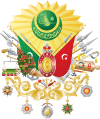Freedom and Accord Party
Freedom and Accord Party Hürriyet ve İtilâf Fırkası | |
|---|---|
| Last Leader | Damat Ferid Pasha |
| Founded | 1911 |
| Dissolved | 1919 |
| Headquarters | Istanbul |
| Ideology | Liberal nationalism Constitutionalism Liberalism |
| Political position | Centre |

The Freedom and Accord Party (Turkish: Hürriyet ve İtilâf Fırkası), formerly and also known as the Liberal Union or the Liberal Entente, was a liberal Ottoman political party active between 1911 and 1913, during the Second Constitutional Era. As the Liberal Union or Liberal Entente, it was the second largest party in the Ottoman Parliament of 1911. It had managed to organize in most of the provinces of the Ottoman Empire. The political programme of the party advocated for Ottomanism, government decentralisation and the rights of ethnic minorities.[1]
The Freedom and Accord Party proper was founded on 21 November 1911 by those Young Turks in opposition to the Committee of Union and Progress,[2][1] and immediately attracted 70 Deputies to its ranks. Only 20 days after its formation, Freedom and Accord won the by-elections conducted in Istanbul by one vote.[3] It was the main challenger to the Committee of Union and Progress during the 1912 elections, which the Committee rigged in favor of itself, giving Freedom and Accord only 6 seats of 275 total. Notable members included Prince Sabahaddin, Kâmil Pasha, Rıza Tevfik Bölükbaşı, Ali Kemal, Refik Halit Karay, Rıza Nur, Mehmed Hâdî Pasha, Damat Ferid Pasha, Mehmed Rauf Pasha, Mizancı Murat, Gümülcineli İsmail, and Lütfi Fikri Bey.
Albanians from the Ottoman Empire played a prominent role in the party, such as Basri Bey Dukagjini from Debre (modern Debar), Hasan Prishtina and Midhat Frashëri (the son of Abdyl Frashëri, who served as a deputy representative for the Yanya Vilayet in the Ottoman Parliament) who were among its eleven founders.[1]
The party was suppressed after the Raid on the Sublime Porte of January 1913, in which the Committee of Union and Progress's leadership, the Three Pashas, grabbed de facto control of the Empire. It was re-established in the aftermath of The First World War. In the post-1918 Ottoman Empire, the party became known for its attempts to suppress and prosecute the Committee of Union and Progress.
Elections
| Election year
votes |
Party list
votes |
% of
party list votes |
Seats won | +/– | |
|---|---|---|---|---|---|
| 1912 | 6 / 275
|
0 | Opposition |
References
Notes
- ^ a b c Gawrych 2006, p. 190.
- ^ Birinci 1990, p. 84.
- ^ Burak, p. 307.
Sources
- Birinci, Ali (1990), Hürriyet ve İtilaf Fırkası (in Turkish), İstanbul: Dergah Yayınları, ISBN 9759953072
- Burak, Durdu Mehmet, Osmanlı Devleti'nde Jön Türk Hareketinin Başlaması ve Etkileri (PDF) (in Turkish), Ankara University, pp. 292–318, doi:10.1501/OTAM_0000000502, retrieved 17 March 2013
- Gawrych, George (2006). The Crescent and the Eagle: Ottoman rule, Islam and the Albanians, 1874–1913. London: IB Tauris. ISBN 9781845112875.

